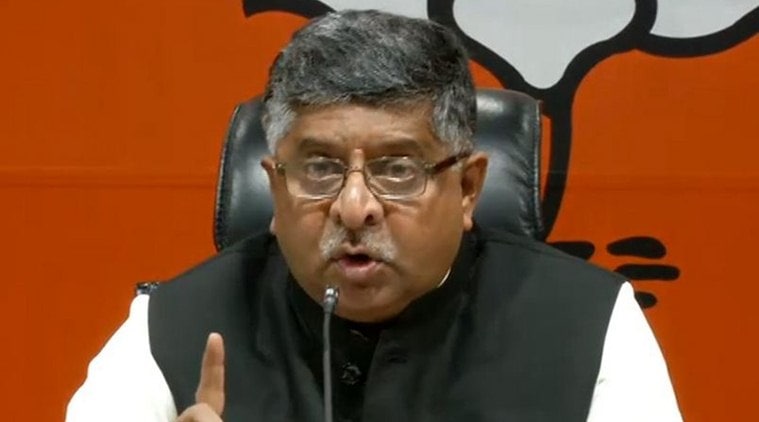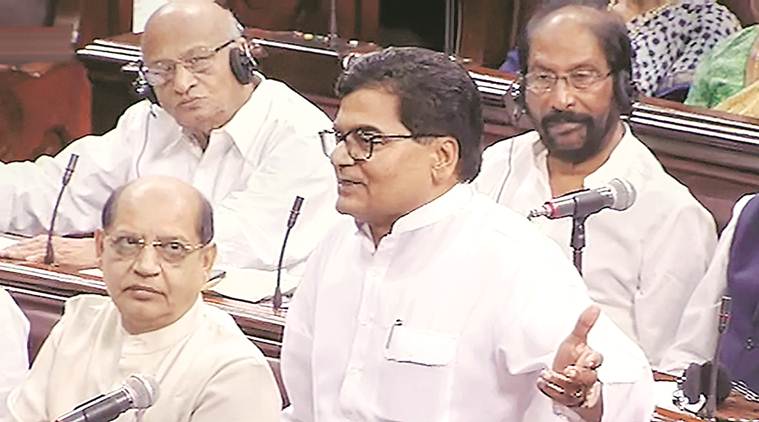Stay updated with the latest - Click here to follow us on Instagram
Opposition parties seek return to ballot, Ravi Shankar Prasad says hypocrisy
Law Minister Ravi Shankar Prasad accused the Opposition of adopting double standards on the issue of EVMs. He said leaders from their parties had become chief ministers, and the Prime Minister, through the same voting process.
 Union Minister Ravi Shankar Prasad. (Twitter/@BJP4India)
Union Minister Ravi Shankar Prasad. (Twitter/@BJP4India)
The debate on electoral reforms in Rajya Sabha on Wednesday saw several opposition parties demanding a return to ballot papers from the electronic voting machines (EVMs) and seeking steps to curb use of money power in elections, while the government and the BJP pitched for Prime Minister Narendra Modi’s “One Nation, One Election” proposal.
Law Minister Ravi Shankar Prasad accused the Opposition of adopting double standards on the issue of EVMs. He said leaders from their parties had become chief ministers, and the Prime Minister, through the same voting process.
“(But) if people of this country elect Narendra Modi, then EVM is faulty. What is this logic,” he asked. “This hypocrisy and double standards impinge upon the polity of the country.”
Opposition members, particularly Congress’s Kapil Sibal, claimed that the BJP outspent other parties in these elections and argued that the saffron party enjoyed complete hegemony on electronic and print media when it came to advertisements.
Along with Sibal, Trinamool Congress’s Derek O’Brien and Samajwadi Party’s Ramgopal Yadav demanded a return to ballot papers. Sibal also hit out at the Election Commission (EC), arguing that he did not see any action from EC when its advisories were flouted and references were made to the armed forces during the campaign phase.
Prasad and BJP’s Bhupendra Yadav pitched for the “One Nation One Poll” and urged the Opposition to consider the proposal with an open mind. Prasad said the government will write to the EC to have a single voters’ list for Lok Sabha, Assembly and panchayat elections.
 Samajwadi Party member Ramgopal Yadav spoke against EVMs. (PTI)
Samajwadi Party member Ramgopal Yadav spoke against EVMs. (PTI)
Modi had referred to the need for having one electoral roll during his reply on the Motion of Thanks to the President’s Address last month.
SP’s Ramgopal Yadav also mentioned the need for one electoral roll. Yadav said governments — at both the Centre and in states — should resign six months before elections.
Minister Prasad said four General Elections and 122 Assembly polls have been held using EVMs. He said Manmohan Singh became the Prime Minister twice on elections held using EVMs. Similarly, leaders of opposition parties such as Akhilesh Yadav, Mayawati and Mamata Banerjee became Chief Ministers, he pointed out.
Replying to the charge of managing traditional and social media, Prasad said, “Stop insulting the voters of this country and try to acknowledge your defeat.”
The minister said the government would not allow misuse of data by foreign powers and said legislation in this regard has been in the works. On electoral funding, Prasad said the government has taken several steps in the last three years to improve the system, and corporate entities have been asked to give donation only through cheques. “But we need to further plug the gaps where the funding part is concerned,” he added.
Initiating the debate, TMC’s O’Brien said Parliament should revisit the process of appointment of Election Commissioners. “Parliament is above the Election Commission… either we amend the Constitution… we will have to see how Election Commissioners are elected,” O’Brien said.
CPI’s D Raja suggested setting up of a collegium to choose and appoint Election Commissioners. Sibal quoted a report by a private agency that suggested that the BJP had spent 45 per cent of the total money spent by all parties in the elections.
Prasad objected to the figures. Sibal, however, asked where the funds had come from and was it black money or white.
Sibal contended that several amendments were made in finance Act and FCRA in the last two or three years to facilitate donations. He alleged that donations were given by companies which were favoured.
Prasad intervened and said Sibal had appeared in court on behalf of the Congress in a case related to FCRA. Sibal denied the charge and mentioned a few case numbers to argue that he had not appeared. Later, Bhupender Yadav reiterated the charge and placed some document on the table of the House.







